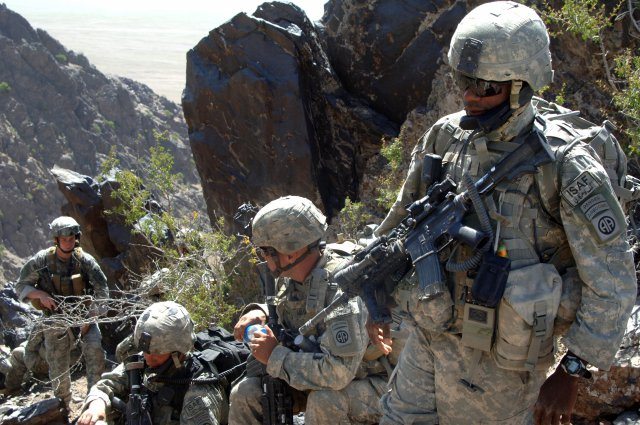Beginning Jan. 1, deploying Soldiers will go for nine months, meaning more time at home with their families.
Secretary of the Army John McHugh signed a directive instituting a nine-month “boots on the ground” policy for deployed Soldiers, providing more “dwell” time at home for Soldiers and families.
“Implementation of this change is based on the projected demand for Army forces, and remains contingent on global security conditions and combatant commanders’ requirements,” said Lt. Col. Peggy Kageleiry, an Army spokesperson.
Corps units and above, and individual augmentee deployments will remain at 12-month deployments.
The goal for the corps units is to eventually get to nine-month deployments.
Most augmentees — those with particular skills or those in low density skill sets and grades — will remain on 12-month deployments.
This change in policy, to be fully implemented by April 1, will affect Soldiers in all named operations, including Operation Enduring Freedom in Afghanistan, Operation Noble Guardian in Kosovo, and Multi-National Forces Sinai in Egypt.
Reserve and National Guard unit tour lengths will be the same as active duty — nine months. In their case, though, deployment and mobilization are two different issues. Even though these units may still be mobilized for 12 or more months, they will only spend nine months of that mobilization deployed.
It is clear to Army senior leadership that there are still issues tied to Guard and Reserve Forces that will need to be worked out, said Kageleiry.
Soldiers deploying under the change in policy will not be granted environmental morale leave — known as R&R;, but commanders will retain the option of granting emergency leave and leave for special circumstances, according to Army regulations and local policy.
“This policy will enhance operational success by reducing the friction that comes with having 10 percent of a commander’s personnel being away on leave in the middle of a deployment,” Kageleiry said.
“Operational continuity is enhanced and risk to the individual Soldier is reduced by not having to move a warrior around on the battlefield to go on leave,” she said.
Also, Kageleiry said, the reduced deployment length could potentially improve Soldier and family quality of life while continuing to meet operational requirements, and is an important step in sustaining the all-volunteer force.
The goal of the policy is to reduce the amount of time Soldiers are deployed and provide more time for them to spend with their families, depending on the needs of the combatant commander and the potential of decrease operations. Units deployed before the policy takes effect, January 2012, will continue to have 12 month deployments.
Currently, deployment has been 12 months with a goal of 24 months at home.
However, the Army will continue to review how to increase the amount of time Soldiers spend at home depending on the amount of time they are deployed.
“We are constantly analyzing all range of policies to address the issues of the mission, Soldiers, and Families. We believe that the current operational environment allows us to adjust the deployment policy in a way that meets all mission requirements and better serve our Soldiers and Families,” Kageleiry said.











